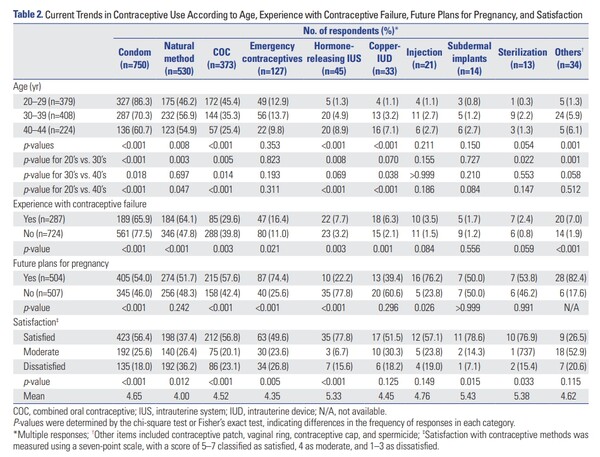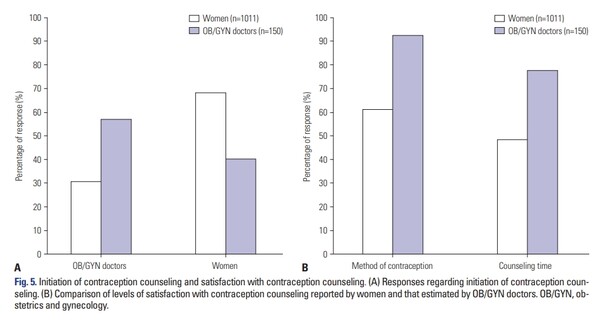In November 2022, the Yonsei Medical Journal (YMJ) published the results of a study titled "Perceptions and Knowledge of Women Regarding Contraception and Current Trends in Contraceptive Use in Korea," which surveyed Korean women and gynecologists.
The study found that despite many advances in contraceptive methods, Korean women still have very little knowledge and use of alternative methods, including long-acting reversible contraception (LARC), besides condoms and natural methods.
However, despite their low use of LARC, women who used it reported high satisfaction, and most women (83.1 percent of respondents) had an unmet need for information about their current and other contraceptive methods.
Notably, the study found a disparity in perceptions between women and gynecologists regarding the provision of contraceptive information. There was a clear difference in perceptions regarding satisfaction with the information provided during contraceptive counseling and the contraceptive methods that patients would choose, assuming they were fully informed.
Korea Biomedical Review met with the study's lead author, Professor Yi Kyong-wook of the Obstetrics and Gynecology Department at Korea University Ansan Hospital, to learn more about the study's background, key findings, and implications.

Question: What made you conduct the study?
Answer: Contraception is an important health issue from a medical perspective and a social one. It's a very important medical issue considering the consequences of not getting it right, such as unwanted pregnancies, resulting procedures, health problems for young women, and secondary social costs.
This study was modeled after the European Thinking About Needs in Contraception (TANCO) study reported in Europe and adapted to Korean conditions by surveying medical professionals and patients to see the differences in various perceptions and satisfaction with contraception between these two groups.
Previous studies focused on small groups of women or young people in Korea, such as teenagers and young adults, but none included multiple healthcare providers. This study is significant because it provides a universal source of data on the views of different healthcare providers in healthcare settings and their perceptions of patients.
Q: What did the survey find about contraceptive use among women in South Korea?
A: We found that women in Korea still use many contraceptive methods with high failure rates, including coitus interrupts (52.4 percent). This is a very important issue and shows that women in Korea are still lagging in their awareness of contraception.
Condoms are an easy-to-use and instant method; when used correctly, they are a good birth control method. However, about 52.4 percent of women in Korea said they still use natural cycles and withdrawal methods, and even those who have failed to use these methods still use them in large numbers. This may be due to a lack of awareness.
Women continue to use certain methods, including LARCs and oral contraceptives, with high success rates for various reasons. Either society might have failed to provide appropriate education, or the nation’s sex education has problems. It's something to think about.

Q: We found the wide awareness gap between Korean women and medical professionals particularly noteworthy.
A: The study also examined healthcare providers' perceptions of how women feel about contraception. Doctors presumed how women would feel about contraceptive methods and why they would not choose specific ones. This included their satisfaction with contraceptive counseling.
The study found that 93.3 percent of medical professionals were satisfied with the information provided during contraceptive counseling, compared to 60.2 percent of women, revealing a significant difference. Satisfaction with the length of the counseling session was also found to be lower among women, with 49.1 percent compared to 78.0 percent for healthcare providers. Women felt they, not doctors, initiated the contraceptive counseling. The two groups also showed differences in their perception of explanations of contraceptive information and methods.
Since these results are the first of their kind in Korea, I think they can serve as a warning to medical staff, especially clinic operators. This is because women do not come to university hospitals for simple contraception. Most seek various contraceptive methods for other medical conditions and purposes.
Healthcare providers should give women information on what is right for them with a full explanation. Many contraceptive options are available to women, depending on their situation, condition, or other comorbidities. For example, the presence of other conditions, such as endometriosis and smoking, should be assessed by healthcare providers, but it is questionable how well this is done in Korea.

Q: There was also a perception gap in the analysis of causes for the low preference of LARC among Korean women.
A: When asked why women do not prefer LARCs like Mirena, healthcare providers cited "financial burden" as the main reason (65.3 percent), while only 16.4 percent of women cited financial burden, showing the largest perception gaps. When LARCs are used for simple contraception, they may not be covered by insurance and may be costly. Perhaps doctors need to be more cautious about recommending it, fearing that patients will feel overwhelmed by the cost.
However, in the case of LARCs, even if they are used for simple contraception, the cost may be less burdensome if you consider the long-term use. I think it is an option that women can consider because it is covered by insurance if they have menstrual-related diseases, including heavy menstruation.

Q: There seem to be other reasons Korean women do not use LARCs despite their high success rates, such as concerns about the safety of hormonal agents and alien materials.
A: That's one of the biggest concerns for doctors, too. In Korea, there is still a lack of knowledge about LARCs, including intrauterine devices and subcutaneous implants, compared to the West, pulling down their uses. Despite the medical evidence on the safety and effectiveness of long-term contraceptives, there seems to be a lot of pressure simply because it is a foreign object. There are also many questions about whether it will interfere with later pregnancies, which is the case with oral contraceptives. These perception barriers seem to pose a challenge.
I'm not trying to increase LARC use. Still, I think all this is because there are fewer opportunities for women to hear about, recognize, and choose this method of contraception even though it is safe and highly effective.
Q: Who should consider using LARCs, then?
A: LARCs like Mirena can be an effective treatment option for women with menstrual problems, including heavy menstruation, dysmenorrhea, or endometriosis. Although endometriosis does not cause heavy periods, LARCs like Mirena have been shown to suppress endometriosis. In particular, Mirena is quite effective in suppressing menstruation, helping to improve symptoms of menstrual-related diseases, including endometriosis and uterine fibroid accompanied by heavy menstruation. Therefore, university hospitals often use Mirena to reduce the symptoms that accompany these diseases. Of course, LARCs can also be considered a first-line option when a patient comes to the clinic solely for contraception.
Q: What should you do to increase women's access to information about various contraceptive methods?
A: Changing contraceptive practices through regional and small medical institutions is very difficult. Eventually, I think the healthcare aspect must be involved. Pharmaceutical companies selling contraceptives produce brochures, but they are mostly for hospitals and not the general public. There is a relevant academic association -- the Korean Society of Contraception and Reproductive Health. Still, due to realistic difficulty, society needs to find a way to carry out public campaign activities, such as making and distributing brochures and educating people. I think the policy-making aspect should accompany such efforts.

